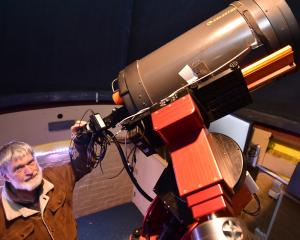Calls not being answered at the Auckland call centre is one of a range of problems southern RDNS home support clients have experienced.
At one stage, the Southern District Health Board suspended new referrals to the service, reinstating them at the end of April.
The service was the subject of 17 complaints in the six months to April 1. Mr Perkinson, of Auckland, on a visit to Dunedin, said the just completed external review by the consultants recommended an eight week improvement programme.
A short term fix was already in place to prevent calls being arbitrarily cut off while people waited.
''It's not acceptable and that's why we put the review in place, and that's why we're putting a fix in place.''
At the interview, Mr Perkinson was accompanied by Melbourne based spokesman John Allin, from the Australian parent organisation, and Dunedin based South Island service delivery manager Adele Knowles.
Some clients had been given a Dunedin based number because of the problem, but it could not be made available to all.
''I'm not sure that that would help in the short term because I would need a lot more staff to answer the phones here,'' Ms Knowles said.
Starting this month, the improvement programme should result in 80% of phone calls answered in 30 seconds.
The company is also introducing smart phones loaded with schedules and client information for carers. They would be used to manage the new carer travel time system. From this month, the Government is paying carers for time spent travelling between jobs.
Mr Perkinson said the smart phones meant less demand on the call centre, especially once the system was established and carers were confident with them. Still in trial phase, the phones were a significant investment.
''That has to be beneficial - they're not using their own personal devices, and we're paying for that.''
Some carers are reportedly unhappy with the devices, but carer Diane Wright said while she initially resisted the idea, she found it useful for managing her schedule.
RDNS recently apologised to Dunedin woman Rose Thornley, who complained to the Health and Disability Commissioner about being sent up to nine different carers a week, timetabling issues, and the call centre. Ms Thornley has multiple sclerosis, and her difficulties led Dunedin South MP Clare Curran to call for a wider investigation.
''It would almost be a good story if she wasn't [calling for an investigation]. That's what a politician will do,'' Mr Allin said.
Mr Allin also suggested people should ''come to Australia'' if they considered the call centre situation unacceptable, referring to issues at various call centres across the Tasman.
The Health and Disability Commissioner referred Ms Thornley's case to the Ministry of Health, which told the Otago Daily Times it was reviewing the complaint.
''For RDNS, the ministry is reviewing the specific issues raised by [Ms Thornley] and will close the complaint when a satisfactory outcome is agreed with the provider,'' national services purchasing manager Stuart Powell said.












